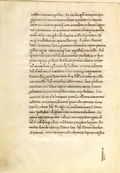Kent State University Leaf 39
This leaf comes from a rare manuscript of Livy's History of Rome (completed in about 9 A.D.) copied in Italy in the middle of the fifteenth century. It measures 22.5 x 16 cm and its vellum is very well prepared, though some rubbing of the ink has cast a shadow over the text block of some pages. The Humanistic script is crisp, clear, and without adornment; an exception is the Denison leaf, with its striking initial "H." See Denison University Leaf 39 for more information about this manuscript.
Text: This leaf contains the text of Livy's History, Book 25, Chapter 9. A scan of the recto is not currently available. The English translation is that of Cyrus Edmonds (1850), via Project Gutenberg.
 Kent Leaf 39 Verso
Kent Leaf 39 Verso
Kent State University Leaf 39 Verso
 Kent Leaf 39 Verso Transcription
Kent Leaf 39 Verso Transcription
posuit; et ne ibi quidem nuntiato quo pergerent, tantum conuocatos milites monuit uia omnes irent nec deuerti quemquam aut excedere ordine agminis paterentur et in primis intenti ad imperia accipienda essent neu quid nisi ducum iussu facerent; se in tempore editurum quae uellet agi. eadem ferme hora Tarentum fama praeuenerat Numidas equites paucos populari agros terroremque late agrestibus iniecisse. ad quem nuntium nihil ultra motus praefectus Romanus quam ut partem equitum postero die luce prima iuberet exire ad arcendum populationibus hostem; in cetera adeo nihil ab eo intenta cura est ut contra pro argumento fuerit illa procursatio Numidarum Hannibalem exercitumque castris non mouisse. Hannibal concubia nocte mouit. dux Philemenus erat cum solito captae uenationis onere; ceteri proditores ea quae composita erant exspectabant. conuenerat autem ut Philemenus portula adsueta uenationem inferens armatos induceret, parte alia portam Temenitida adiret Hannibal; ea mediterranea regio est orientem spectans; busta aliquantum intra moenia includunt. cum portae adpropinquaret, editus ex composito ignis ab Hannibale est refulsitque idem redditum ab Nicone signum; exstinctae deinde utrimque flammae sunt. Hannibal silentio ducebat ad portam. Nico ex improuiso adortus sopitos uigiles
 Kent Leaf 39 Verso Translation
Kent Leaf 39 Verso Translation
...he only called them together and admonished them to march all of them in the road, and not to suffer any one to turn aside or deviate from the line; and above all, that they would be on the watch, so as to catch the word of command, and not do any thing without the order of their leaders; that in due time he would issue his commands as to what he wished to be done. About the same hour a rumour reached Tarentum, that a few Numidian horsemen were devastating the fields, and had terrified the rustics through a wide extent of country; at which intelligence the Roman praefect took no further step than to order a division of his cavalry to go out the following day at sunrise to check the depredations of the enemy; and so far was he from directing his attention to any thing else on this account, that on the contrary, this excursion of the Numidians was a proof to him that Hannibal and his army had not moved from his camp. Early in the night Hannibal put his troops in motion, and Philemenus, with his customary burden of prey taken in hunting, was his guide. The rest of the conspirators waited the accomplishment of what had been concerted; and the agreement was, that Philemenus, while bringing in his prey through the small gate by which he was accustomed to pass, should introduce some armed men, while Hannibal in another quarter approached the gate called Temenis, which faced the east, in that quarter which was towards the continent, near the tombs which were within the walls. When he drew near to the gate, Hannibal raised a fire according to agreement, which made a blaze; the same signal was returned by Nico, and the fires were extinguished on both sides. Hannibal led his troops on in silence to the gate. Nico suddenly fell upon the guards while asleep...